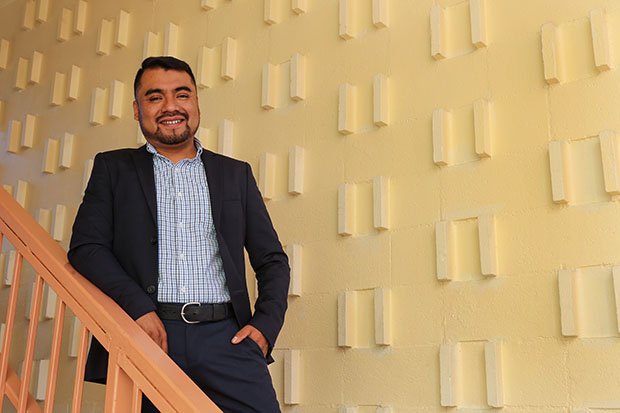Crisis communicator
Arcenio Lopez '19 founded a corps of professional indigenous-language interpreters.
The most pressing matters in the lives of 20,000 Mexican immigrants in Ventura County can get lost in translation.
Because of a misunderstanding, they might lose their freedom. Their attacker could go unpunished. Their illness might go untreated.
To be sure, the courts, the police departments and the medical providers in this county routinely employ workers fluent in Spanish. So what is the problem?
Mexican immigrants who speak Mixtec, Zapotec or another Indigenous language are not served by Spanish interpreters. (In Southern California, these languages are often referred to by their names in Spanish. But neither Mixtec nor mixteco is the preferred term from the perspective of native speakers. In the various dialects of Mixtec, Indigenous people refer to themselves with an expression meaning “people of the rain” and to their language with another that translates as “word of the rain.”)
“It is a popular misconception that these are dialects of Spanish,” said Arcenio Lopez ’19, who graduated from the Bachelor’s Degree for Professionals program with a BS in accounting. “They are unique languages. Mixteco alone has 80 different variants.”
As executive director of the Mixteco/Indígena Community Organizing Project (MICOP), Lopez is on the forefront of the language-justice movement. He is responsible for the creation of an Oxnard-based corps of professional Indigenous-language interpreters.
Lopez came to Oxnard in 2003 from Oaxaca, Mexico, where he grew up speaking Mixtec. Spanish, his second language, was demanded of him by the Mexican public schools. A quick study, he learned English picking strawberries in California.
Three years later, he was working as MICOP’s first community organizer among farmworkers in the fields of El Rio. There, he witnessed how the inability of many Mixtec speakers to communicate either in Spanish or English resulted in workers being denied labor rights. He also heard of cases in which Indigenous defendants were jailed because a translator failed to help them understand the charges against them.
At that time, MICOP had a few promotores who spoke indigenous languages but lacked training in interpretation.
Lopez believed more education would bolster their confidence when interacting with authority figures like judges, police officers and doctors, not only to translate the words but also to explain the cultural norms of indigenous people.
As an example, Indigenous women believe only a female physician should examine their reproductive organs, whereas in other cultures the doctor’s gender makes no difference.
As trained interpreters, “they would become a bridge between the community and the providers,” he said.
Lopez developed a 40-hour training course and then contracted out the interpreters to organizations in touch with Indigenous residents.
“We started very small, only 20 hours of contracts a month,” he said.
The Oxnard Police Department contracted for the service eight years ago. “We knew we needed to provide a better environment for victims of confidential crimes like sexual assault and domestic violence,” said Cmdr. Sharon Giles. Sometimes neighbors were pulled in to translate, she said, or officers attempted to question victims in Spanish.
“We were up against the wall. We were losing information,” Giles said.
Now, an English-speaking detective can work with a professional interpreter who speaks English and Mixtec, cutting Spanish out of the equation. This makes questioning more private for an indigenous victim of crime and provides clarity for the detective who must write the report in English, Giles said.
Today, MICOP translators are billing 200 to 300 hours a month and serving in health clinics, school districts, hospitals, workers’ compensation offices, an agricultural relations board, and even a state of Maryland Superior Court.
In addition, MICOP launched Radio Indígena 94.1FM, one of the first radio stations in the United States to broadcast in indigenous languages and the subject of a recent NBC News report.
Listeners are greeted with tanìndíí — “good morning.” Mixtec uses its own writing system and tones that vary by the dialect.
Offering platforms for the native language of a people to be heard and spoken is a way to empower them. “When a language dies you have lost your identity,” Lopez said, “and when that happens, it is hard to be a success.”
For more about MICOP’s work, visit mixteco.org.
Colleen Cason is an award-winning journalist and longtime columnist for the Ventura County Star. A Thousand Oaks resident, she has served as adviser to The Echo student newspaper and currently edits Central Coast Farm & Ranch magazine.
